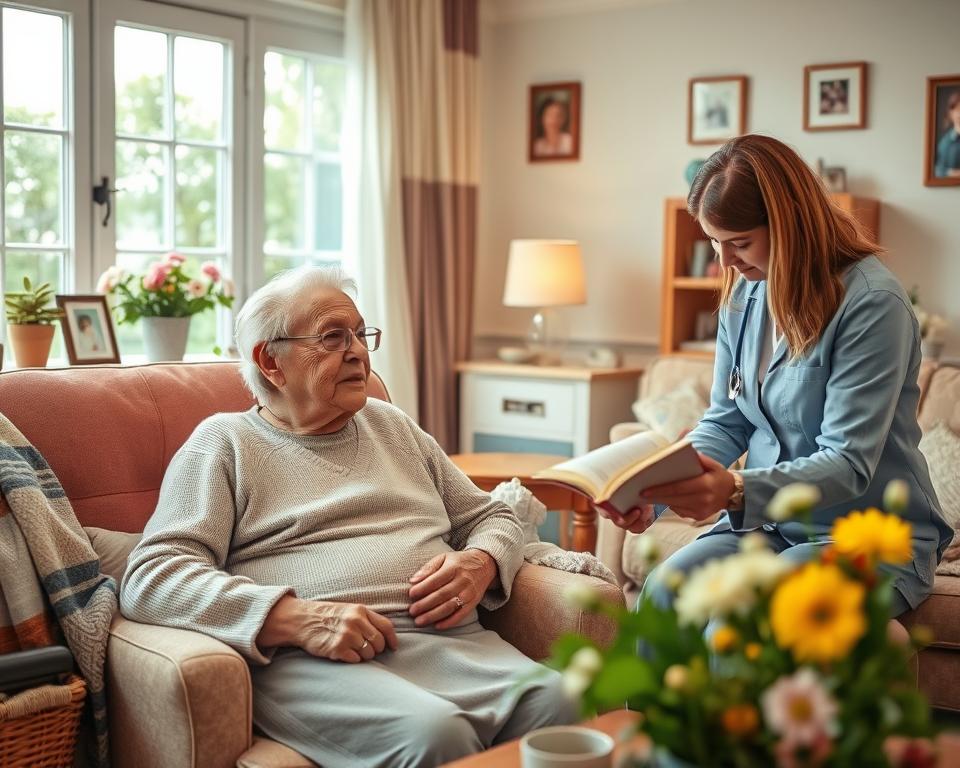Canada is in a situation where there is a rising demand for elder care as the population is becoming old. Ontario, which has a lot of families, is caring for their elderly people. These caregivers need the right information and resources to provide quality care for seniors.
For the elderly who want to stay at home, the home healthcare standards are the best. They provide assistance with daily tasks, transportation, and home modifications. This support is a necessity for their autonomy.
The important part of the caregiver’s certifications in Ontario is that they are not a regulation but a demonstration of the fact that the provider is committed to the care of the elder. This means a service, which is based on treating the older persons with respect and empathy.
Canada should be working on seniors’ quality of life, both in terms of health and longevity. The National Seniors Council has provided 20 suggestions, such as the provision of quality care in the home.
Key Takeaways
- Familiarize with the growing need for caregiver support due to Canada’s aging demographic.
- Understand the significance of comprehensive caregiver training and certifications.
- Acknowledge the complexity of home care services, ranging from health care to day-to-day assistance.
- Recognize transportation and personal care services as key factors in a senior’s independence.
- Explore options that balance a senior’s desire for independence with the need for quality in-home care.
- Consider the financial landscape surrounding senior care, including insurance and government support.
- Review the National Seniors Council’s recommendations to support aging at home.
Understanding the Importance of Quality Senior Care
One of the main reasons why quality senior care is a must in Canada is the graying (the country’s population is aging). It is of paramount importance as on the one hand it helps older adults to continue to be independent and dignified. Aging care involves offering services that cover daily living and health needs.
The importance of caregiver qualifications is the major element. Caregivers such as nurses and nursing assistants are equipped with skills to handle the seniors’ unique needs. Their skills and empathy create supporting conditions which is crucial for the seniors’ well-being.
Effective geriatric care enhances wellness, life span, and satisfaction. Seniors, who are lonely, and have mobility problems will be assisted with quality senior care. Also, these services help to maintain social engagement which is vital for retention of mental sharpness.
Senior care makes more than physical care; it makes lives better. Communities as well as families should place a premium on skilled caregivers’ training. An adept caregiver demonstrates love, respect, and an accurate understanding of elderly people.
Researching Home Care Options
When a family needs to make a decision regarding the caregiving services for a family member, the ability to make that decision is core to the successful process. It is possible to assist aging family members with living arrangements so they can stay home or get a nursing home. It is very important to make sure of home care standards and services offered.
The distinction between short-term and long-term care must be recognized. Short-term care is necessary for recovery and for temporary assistance in emergencies. Along with this, Long care is for the later stages of someone’s life having illnesses.
- Individual care plans are a huge benefit, making it possible for senior care services to address each person’s specific needs and preferences.
- This way the seniors are enabled to stay independent by being assisted in a timely manner.
- Safety, comfort, and happiness are the main focuses to be considered. Bring up the issue of the caregiver being able to avoid accidents and providing companionship.
When considering which care to choose, the financial aspect is of utmost importance. In-home care for the elderly can cost between $20 and $30 per hour. People who are thinking of sending an elderly family member to a facility should consider their finances and whether the place offers the care they need. Residential homes are always more costly than home care services.
- In the beginning, find out what the elderly requires in terms of care and what they prefer.
- Moreover, check out other providers that offer nursing, quality assurance, and reputation reviews of their employees.
- Please ensure that the care agency complies with quality senior care regulations.
- When you visit the place where care is given, you will truly experience it.
Methodically conducting thorough research, in addition to a diligent review of the available options, is Key to Error-Free Decision – Making by Families. Moms and dads will choose the model of care which they believe fits best their family member’s desires and requirements.
Education and Qualification Requirements for Caregivers in Ontario
In Ontario Caregivers’ qualification criteria are set high. In Their case, they even involve the excessive requirement of home healthcare provision. Those who are positioning themselves to give care to the elderly are obliged to read some prescribed educational courses and then successfully finish a very hard certification course. This is a means of sparring high levels of clauses for the elderly.
Caregivers in Ontario must finish certification courses that meet the Ministry of Long-Term Care’s strict rules. They learn how to manage different health issues and treatments. This helps make elderly care services safer and better in homes and long-term care places.
- To be a caregiver, you need an Ontario Health Card and to show you understand healthcare needs that need professional help.
- Candidates go through a detailed assessment to see if they can provide the needed care.
- Training programs last from 5 to 50 hours and are flexible to fit different schedules.
For example, the PSW (Personal Support Worker) Online Training at the College of Health Studies is quite in-depth. It lasts up to eight months. It covers important skills like managing medicines safely, creating care plans, and helping with care setting changes. These skills are key in elderly care services.
- Certification from respected sources like the Canadian Red Cross shows a caregiver is ready to give caring, skilled, and committed care.
- Platforms like CareAcademy offer lessons that are easy to access on mobile devices. This makes learning flexible for those who want to become caregivers.
In the end, Ontario’s careful training and certification make sure caregivers are not just qualified but also truly care about the elderly. This strong system supports the best in home healthcare. It protects the dignity and quality of life for seniors.
Assessing Caregiver Qualifications and Training
When picking a caregiver, their skills and training are key. They decide the quality of care your loved one gets. Look closely at several important areas to make sure they meet high standards.
Caregiver certifications are vital. They show a caregiver can do their job well. Nurses or Home Health Aides have the skills for daily tasks and medical care. It’s important they have these certifications and keep up with new training.
Checking caregiver qualifications means more than just training. It’s also about their real-world experience. More experienced caregivers handle tough care situations better. Plus, knowing they have a good history through references gives you peace of mind.
- Double-check the caregiver has valid certifications like CNA or HHA.
- Verify their experience through detailed discussions and references from past employers.
- Ensure they have undergone comprehensive background checks and drug screenings.
- Discuss their familiarity with medication management to ensure they can administer and manage medicines safely.
- Understanding the scope of services the caregiver is trained to provide ensures they can meet the specific needs of your loved one.
It’s also key to see if the caregiver can talk well. Good communication is for care and building trust. Talking well helps in coordinating care and changing needs.
By carefully looking at caregiver certifications, skills, and qualities, you pick a caregiver ready to care. This care improves the well-being and happiness of seniors.
Ensuring Compliance with Home Care Standards and Regulations
Keeping high home care standards is key for better elderly well-being. In Canada, rules and guidelines cover all home care aspects. They aim to create a safe, caring space for seniors. Following these standards helps keep seniors physically healthy and maintains their dignity and freedom.
- Facility Standards: Homes must have grab bars, ramps, and non-slip mats to prevent falls, a big risk for seniors.
- Medication Management: Homes need clear rules for handling seniors’ medicines. This helps avoid mix-ups, errors, or overdoses.
- Infection Control: Keeping hygiene strict is crucial for seniors with weak immune systems to avoid infections.
- Fire Safety: Regular checks and updates are needed to protect against fires from forgotten stoves or appliances.
- Environmental Health: Homes must be free from dangers like bad air, dust, or harsh cleaners that can hurt breathing.
Following Home Care Standards and Rules
Home care standards and rules are very important. Caregivers need to be well-trained and pass tests. This includes background checks and skills tests to show they can handle the complex needs of seniors.
Regulatory groups keep updating these standards to meet the changing needs of elderly care. The latest changes in the Residential Care Regulation show a strong commitment to improving care quality. This ensures home care is done with the highest professionalism and care for seniors.
In summary, following home care standards and rules is more than just legal. It’s essential for providing top-notch care that values and supports the elderly. It also ensures their health and safety.
Evaluating the Caregiver’s Compassion and Attentiveness
Compassionate care, caregiver attentiveness, and quality elderly care services greatly affect seniors’ happiness and health. It’s crucial to look at a caregiver’s skills and their ability to offer emotional and social support.
To check these important points, add these steps to your evaluation:
- Watch how the caregiver talks and interacts with the elderly. Look for meaningful conversations and comfort.
- Check what others say about the caregiver’s empathy, patience, and personal connection.
- Have interviews to see if the caregiver values emotional support. This shows their true understanding.
- See if the caregiver meets the elderly’s needs on time and with care. This shows their attention to detail.
Also, look for certifications like those from dementia education programs. These can show a caregiver’s skills in:
- Reading and responding to emotional signs, which boosts care.
- Handling unexpected situations with problem-solving skills.
- Respecting different cultures for personalized care.

Using these methods helps find caregivers who are both skilled and caring. This ensures a supportive environment for seniors’ overall well-being.
Monitoring and Maintaining Quality of Care
Keeping quality senior care high means always watching and keeping care up to date. It’s key to follow home healthcare standards and meet seniors’ changing needs. To do this, several important steps are needed.
Caregiver attentiveness is crucial for checking on seniors’ health and happiness. It’s important to check how well caregivers do their job. They should be caring and meet each senior’s unique needs. This way, seniors can live comfortably at home.
- Regular Assessments: Scheduled checks make sure care is good, like managing medicines and food, and responding to health changes.
- Feedback Mechanisms: Good ways to share thoughts from seniors and their families help keep care quality high.
- Training and Development: Keeping caregivers up-to-date with new care methods and rules helps improve care quality.
By following these steps, home care services and families can make sure care is safe and caring. The goal is to make seniors’ lives better, making their years as good as they can be.
Considering Specialized Care Needs
When looking to improve the lives of seniors, it’s key to create personalized care plans that fit their health needs. In Canada, specialized elderly care services have grown. They now meet not just basic health needs but also complex conditions with custom care. These services follow strict home healthcare standards, making sure each person’s unique needs are met.
Understanding the effects of these specialized services is important. They cover physical therapies for issues like arthritis or mobility loss. They also include cognitive therapies for mental health problems like Alzheimer’s or dementia. And, they offer end-of-life care that focuses on the patient’s comfort and dignity.
- Evaluating Care Needs: It’s crucial to check the care level needed. This ensures the care plan meets the senior’s health conditions.
- Flexible Care Options: Care must be adaptable as seniors’ health needs change. Having flexible specialized elderly care services is key to their quality of life.
- Professional Staffing: It’s important that the care team is trained, certified, compassionate, and attentive. This is essential for delivering top-notch care.
For seniors, living in a caring environment with access to specialized care greatly improves their lives. Focusing on these detailed aspects of care ensures seniors get the medical attention they need. It also gives them the respect and quality of life they deserve.
Balancing Quality Care with Affordability
It’s a big challenge to get quality senior care without spending too much. Many Canadian families struggle with this every day. As more people turn 75 and older, finding cost-effective elderly care is key. Over 25% of healthcare spending goes to this age group, showing the big investment in affordability home healthcare.
But, we still need to make sure every senior gets the care they need. This means we need more funding and resources.
There are many care options, like in-home services or assisted living. Families must look at the costs to find the best value. In-home care, for example, costs between $20 to $30 an hour in the U.S. This is cheaper than the costs of living in a care home.
- Looking into government benefits and tax credits is important to help pay for care.
- It’s crucial to compare different care types to find the most cost-effective ones without losing quality.
- Good budgeting and financial planning are key to securing care for the long term.
Also, 30% of long-term care home entries could be prevented with more home support. This shows we need to invest more in home and community care. Such investments could help more seniors stay in their homes, which most prefer.
Families should focus on both financial and care planning. This ensures seniors get the care they need while keeping their dignity and quality of life. As healthcare changes, keeping quality care affordable is essential for a supportive environment for all seniors.
Conclusion
In Canada, making sure seniors get top-notch care is a big deal. It helps keep their dignity and independence. With more seniors needing help, it’s key to focus on their overall well-being.
Having well-qualified caregivers is very important. They need to meet high standards to help with medical needs and emotional support. This ensures seniors get the care they need in their own homes.
A good caregiver does more than just help with daily tasks. They make a big difference in a senior’s life. They offer companionship, help with emergencies, and even help with healthcare access.
Home care services work hard to meet each senior’s unique needs. They create care plans that show they truly care. This shows that every senior is treated with respect and understanding.
The role of a caregiver goes beyond just helping. They make sure seniors stay safe and active. They also give family members a break, so they can take care of themselves.
Keeping high standards in home care is essential. It ensures seniors live their lives with dignity and happiness. This is why finding and keeping great caregivers is so important.








